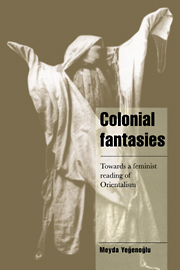Book contents
- Frontmatter
- Contents
- Acknowledgment
- Introduction
- 1 Mapping the field of colonial discourse
- 2 Veiled fantasies: cultural and sexual difference in the discourse of Orientalism
- 3 Supplementing the Orientalist lack: European ladies in the harem
- 4 Sartorial fabric-actions: The Enlightenment and Western feminism
- 5 The battle of the veil: woman between Orientalism and nationalism
- Notes
- Bibliography
- Index
1 - Mapping the field of colonial discourse
Published online by Cambridge University Press: 22 October 2009
- Frontmatter
- Contents
- Acknowledgment
- Introduction
- 1 Mapping the field of colonial discourse
- 2 Veiled fantasies: cultural and sexual difference in the discourse of Orientalism
- 3 Supplementing the Orientalist lack: European ladies in the harem
- 4 Sartorial fabric-actions: The Enlightenment and Western feminism
- 5 The battle of the veil: woman between Orientalism and nationalism
- Notes
- Bibliography
- Index
Summary
The Orient: a suppressed authenticity or an idea without a referent?
Edward Said's Orientalism offers a powerful analysis of the structure of those varied Western discourses which represent the Orient and Islam as an object for investigation and control. By covering a historical corpus of literary, scientific, and diplomatic discourses, Said brings to our attention a textual universe which draws an imaginative geographical distinction between the peoples and cultures of the West and East. We learn from Said that a vast array of rhetorical figures and discursive tropes were employed by the West to represent and know the Orient.
However, Said's work is not merely about how Europe represented the Orient, it also raises some significant general theoretical and political questions. By offering a rich panorama of the ways in which Orientalist texts constitute the Orient as a racial, cultural, political, and geographical unity, Orientalism also provides a fruitful arena where questions of a more general nature, questions that pertain to the representation of cultural and sexual difference and the nature of the discursive constitution of otherness, could be raised. Said's analysis demonstrates that what is at stake in the constitution of the Oriental other is the West's desire to set boundaries for itself as a self-sustaining, autonomous, and sovereign subject. He illustrates the dialectics of self and other that is at play in Orientalist discourse by continually alluding to the establishment of a binary opposition between the Orient and Occident as the primordial technique operating at its very core.
- Type
- Chapter
- Information
- Colonial FantasiesTowards a Feminist Reading of Orientalism, pp. 14 - 38Publisher: Cambridge University PressPrint publication year: 1998

